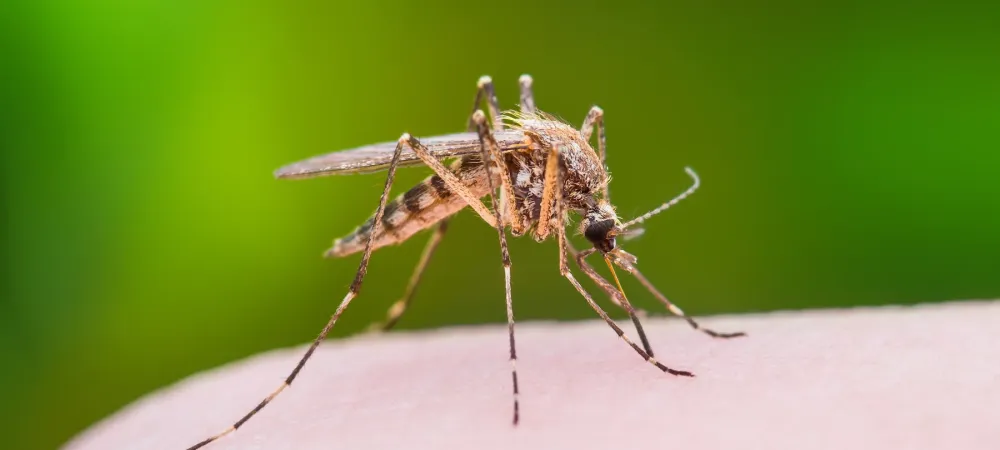Mosquitoes in North Carolina: The Complete Guide

North Carolina has just the right warm, humid climate that makes it a hotbed for mosquito breeding! It’s important to protect you and your family from these dangerous, annoying pests. However, not all mosquitoes are alike. There are a variety of different types that not only cause a nuisance with their buzzing and stinging, disrupting any outdoor gathering, but these pests can carry and spread dangerous diseases. Read on to learn all about mosquitoes in North Carolina!
Types of Mosquitoes in North Carolina
There are 5 types of mosquitoes in North Carolina. They include:
- Asian Tiger Mosquitoes. The Asian Tiger Mosquito gets its name from its black and white striped body. Originating from the tropical regions of Asia, it has now found a comfortable breeding ground in North Carolina.
- Yellow Fever Mosquitoes - Yellow Fever Mosquitoes are similar to the Asian Tiger Mosquito, however, it has white markings on the legs. These mosquitoes spread yellow fever, a dangerous disease that affects the liver and kidneys.
- Common Malaria Mosquitoes - The Common Malaria Mosquito is brown in color and lands flat on the skin, as opposed to landing at an angle. This mosquito can carry the parasite that causes malaria, a dangerous disease that causes high fevers and shaking chills. Roughly 400,000 people die from malaria each year worldwide.
- Common Household Mosquitoes - Although "common" is in the name, you shouldn't underestimate them. Also known as culex pipiens, this brownish-colored mosquito plays a critical role in the transmission of pathogens to humans, livestock, and animals. In North Carolina, La Crosse encephalitis virus is most commonly spread by these mosquitoes.
- Gallinipper Mosquitoes - The yellow-colored Gallinipper Mosquito, also known as the Psorophora ciliata, is very large in size with a wingspan of 7-9mm. They are known for their “shaggy legs'' and are the more aggressive of the mosquitoes in North Carolina.
Learn when mosquitoes are active in North Carolina.
Are Mosquito Bites Dangerous?
Mosquito bites can be dangerous. Each of the 5 types of mosquitoes found in North Carolina can carry dangerous diseases that cause serious illness in addition to the itchy swollen bumps they leave behind.
What Stops Mosquito Bites From Itching?
You should refrain from scratching mosquito bites as the pain will worsen. There are over-the-counter products that relieve some of the itching from the histamine your body releases in response to the bite. The topical treatments that can stop mosquito bites from itching include antihistamines, hydrocortisone, ice, aloe vera, chamomile tea, honey, or oatmeal applications to provide some soothing relief.
Female Mosquitoes vs Male Mosquitoes
There are several noteworthy differences between female mosquitoes and male mosquitoes.
- Bites - A male mosquito minds his own business and feeds on the nectar from plants. A female mosquito seeks blood for sustenance, so you can blame female mosquitoes for bites!
- Size - A female is 2 milligrams larger than a male.
- Appearance - Male mosquitoes have finer hairs called flagella on their antennae to better hear a female mosquito for mating. A female's antennae contain odor receptors to help find sources of blood.
- Lifespan - In terms of lifespan, females live from two to four weeks, while males live only a week or two.
- Buzzing - A female mosquito can beat its wings up to 500 times per second creating a high-pitched buzzing sound to attract a mate. This is the annoying buzz you hear when one flies by your ear.
Learn more about the lifecycle of mosquitoes.
Getting Rid of Mosquitoes
There are many routes you can take to get rid of mosquitoes. Whether you prefer natural repellants or professional services, it's important to get rid of a mosquito infestation as soon as possible.
Natural Mosquito Repellants
There are several natural mosquito repellents that can protect you. Centers for Disease Control recommends eucalyptus oil as an effective ingredient in mosquito repellant. Other natural repellants include crushed lavender, cinnamon oil, and thyme oil, which produce a fragrance that repels mosquitoes. Learn how to make your own DIY mosquito spray and what plants naturally repel mosquitoes.
Call Wolfpack for Professional Mosquito Control
Mosquitoes in North Carolina are a pervasive problem, and DIY treatments rarely work in the long term. In order to protect yourself and your family from nasty bites and dangerous diseases, you need professional pest control. Wolfpack Pest Control has been a leader in innovative pest control for almost 50 years and provides highly effective mosquito services in Albemarle. Wolfpack Pest Control’s highly trained technicians will inspect and treat your property and guarantee our services, or we will come back for free retreatments. Enjoy the outdoors safely again by contacting the experts at Wolfpack Pest Control.
How Long Do Mosquito Bites Last?
Mosquito bites typically last a few days.
How Long Do Mosquitoes Live?
Mosquitoes in North Carolina live anywhere between 1-4 weeks.
What Blood Type Do Mosquitoes Prefer?
There actually seems to be a blood type preference among mosquitoes in North Carolina. Research shows that most mosquito species prefer blood Type O in humans.
What Eats Mosquitoes?
It may surprise you to find that other insects eat mosquitoes in North Carolina which include dragonflies, spiders, and ants. Other creatures that feed on mosquitoes include bats, turtles, frogs, and many birds. Some species of fish consume mosquitoes and their larvae as well as some plants such as the Venus Flytrap and the Sundew.
When Do Mosquitoes Go Away?
Mosquitoes in North Carolina become less active and start to go away in November. Once the temperature starts to fall into the 50s, they significantly reduce their breeding.
